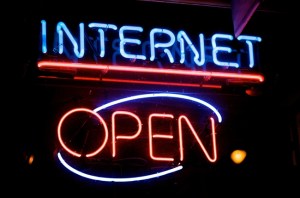Author Bonnie Kristian being net neutral or something.
Videos by Rare
Net neutrality is regularly in the news, but it’s a confusing topic at best—with both sides of the debate declaring themselves the Last True Defenders of the free internet. So here’s a quick guide to net neutrality and where the real danger to liberty actually lies.
What is net neutrality? In simplest terms, it’s the idea that internet service providers (ISPs) like Comcast shouldn’t favor some websites over others by making it faster for users like us to connect to/stream from the favored sites.
Why would companies oppose net neutrality? Well, for ISPs, it’s largely a financial decision. It costs them more to stream more data, so they’d like to be paid more for it. And this isn’t totally unreasonable: It’s pretty common to charge more money for more of a product or service.
There’s also what amounts to an advertising opportunity: For example, Comcast could say to Netflix, “We’re the only way you can deliver your product to your consumers in many areas, and it costs us a lot to make that happen. Pay us a fee or we’ll throttle your speeds—and your customers won’t like that.”
Why would someone who isn’t an ISP oppose net neutrality? Net neutrality opponents typically aren’t making the case that unequal internet access is desirable for users. That would be annoying, and it has a real potential for abuse. For instance, why would Comcast want to make it easy for you to research other ISPs in your area?
But there are also questions of freedom at stake: Why does the government get to regulate businesses’ pricing plans? And what if an ISP’s owners have a moral or religious conviction about blocking certain content, like Westboro Baptist Church sites or child pornography? Also, saving money by throttling speeds could potentially help new ISP competitors get off the ground.
Do we have net neutrality now? Yes and no. Many ISPs comply with the principles of net neutrality voluntarily, but the old laws which mandated it were struck down in a court decision in January. Since that decision is so recent, not much has changed yet. However, the FCC (the agency responsible for administrating these rules) is working to instate new rules ASAP.
How does net neutrality affect me? For most of us, net neutrality (or lack thereof) could become an issue because often ISPs operate a virtual monopoly on a local scale. Many internet users can’t turn to a competitor company if their internet provider starts blocking or slowing access to content they want. Obviously that sucks. That said, as new internet access options like Google Fiber and even smartphones develop and advance, this may become less of an issue going forward.

What are potential side effects of net neutrality? Here’s where we get to tricky issues net neutrality supporters often don’t like to address. The big one is that even as net neutrality is up in the air, the FCC is gaining more control over the internet—control which I’d say is more dangerous to a free internet than ISPs throttling speeds. Look at what came out of the very court decision which struck down the old rules:
[S]ince the court’s decision…[w]ith the appropriate legal arguments, the FCC not only has the authority to tell broadband providers they can’t block or discriminate against traffic on their networks—that is, to enforce Net neutrality—but it also has the authority to regulate broadband rates, as well as regulate pricing for all services connected to the Internet, from streaming video services like Netflix to Internet-based home surveillance services.
Yeah, you read that right: The FCC could regulate the cost of Netflix. And:
The FCC might even have the authority now to require blocking of sites suspected of hosting pirated content, just as the rightly defeated Stop Online Piracy Act [SOPA] would have done.
The FCC’s response is basically, “Trust us”—but in the age of Edward Snowden, trusting government is rightly not on the top of many people’s agendas. The Electronic Frontier Foundation has done a good job spelling out some of the issues of favoritism and potential for abuse which is rife in the FCC’s internet regulation endeavors.
So is net neutrality good or bad? It’s both, really. The prospect of unequally throttled internet with no competing ISPs sucks. But so does giving the FCC increased power to regulate the prices, internal workings, and blocking practices of ISPs.
The ideal would perhaps be for all ISPs to practice net neutrality voluntarily—or at least offer a “net neutrality package” for consumers willing to perhaps pay slightly more for equal speeds and access. Or maybe there’s another, better, idea for mediating these competing interests altogether.
But if the FCC gets its way, we can only look forward to a less free—and likely even less neutral—internet.




